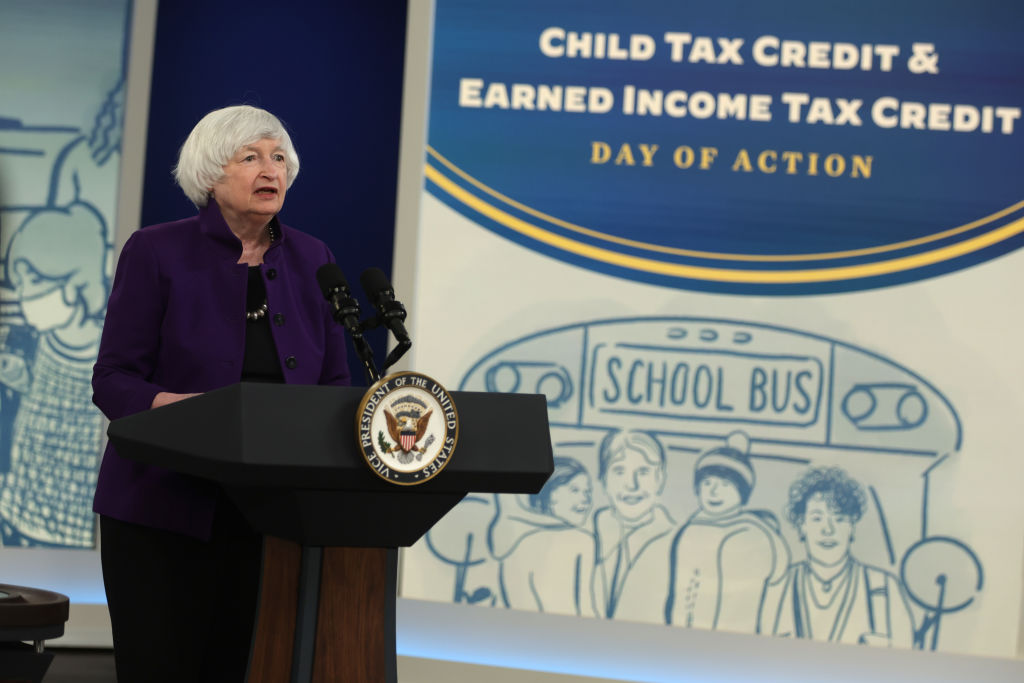Child poverty hit record low in U.S. in 2021, Census data show


A free daily email with the biggest news stories of the day – and the best features from TheWeek.com
You are now subscribed
Your newsletter sign-up was successful
The child poverty rate fell to a record-low 5.2 percent in 2021, down from 9.7 percent in 2020 and 27.9 percent in 1993, the U.S. Census Bureau said in a report Tuesday. The Census report also found that the percentage of uninsured Americans dropped to 8.3 percent, or 27.2 million people, last year, from 8.6 percent in 2020.
The drops were attributed largely to temporary expansions of the social safety net during the COVID-19 pandemic, especially the augmented child tax credit enacted in 2021's American Rescue Plan, and increased Medicaid enrollment tied to a COVID relief bill passed in March 2020.
The child tax credit expansion, which expired at the end of 2021 and has not been renewed, gave parents more money to spend on essentials, says Sharon Parrott at the Center on Budget and Policy Priorities."They spend it on their housing, food, education, they're able to do some of those extracurricular activities that high income families take for granted," she told NPR. "They are investing in their kids and their families are able to make ends meet in really important ways." The loosened Medicaid rules will likely expire in a few months.
The Week
Escape your echo chamber. Get the facts behind the news, plus analysis from multiple perspectives.

Sign up for The Week's Free Newsletters
From our morning news briefing to a weekly Good News Newsletter, get the best of The Week delivered directly to your inbox.
From our morning news briefing to a weekly Good News Newsletter, get the best of The Week delivered directly to your inbox.
"Fewer children growing up in poverty is good for the future," said Renee Ryberg, who examined the new Census data for a report by Child Trends. "It's as simple as that." That report found that child poverty has fallen in every state and disparate households — white, Black, Hispanic, Asian, immigrants, with one or two parents. "A childhood free of poverty predicts better adult outcomes in just about every area you can imagine, including education, earnings, and health," Ryberg tells The New York Times.
A free daily email with the biggest news stories of the day – and the best features from TheWeek.com
Peter has worked as a news and culture writer and editor at The Week since the site's launch in 2008. He covers politics, world affairs, religion and cultural currents. His journalism career began as a copy editor at a financial newswire and has included editorial positions at The New York Times Magazine, Facts on File, and Oregon State University.
-
 How the FCC’s ‘equal time’ rule works
How the FCC’s ‘equal time’ rule worksIn the Spotlight The law is at the heart of the Colbert-CBS conflict
-
 What is the endgame in the DHS shutdown?
What is the endgame in the DHS shutdown?Today’s Big Question Democrats want to rein in ICE’s immigration crackdown
-
 ‘Poor time management isn’t just an inconvenience’
‘Poor time management isn’t just an inconvenience’Instant Opinion Opinion, comment and editorials of the day
-
 Trump HHS slashes advised child vaccinations
Trump HHS slashes advised child vaccinationsSpeed Read In a widely condemned move, the CDC will now recommend that children get vaccinated against 11 communicable diseases, not 17
-
 Stopping GLP-1s raises complicated questions for pregnancy
Stopping GLP-1s raises complicated questions for pregnancyThe Explainer Stopping the medication could be risky during pregnancy, but there is more to the story to be uncovered
-
 Tips for surviving loneliness during the holiday season — with or without people
Tips for surviving loneliness during the holiday season — with or without peoplethe week recommends Solitude is different from loneliness
-
 More women are using more testosterone despite limited research
More women are using more testosterone despite limited researchThe explainer There is no FDA-approved testosterone product for women
-
 Climate change is getting under our skin
Climate change is getting under our skinUnder the radar Skin conditions are worsening because of warming temperatures
-
 FDA OKs generic abortion pill, riling the right
FDA OKs generic abortion pill, riling the rightSpeed Read The drug in question is a generic version of mifepristone, used to carry out two-thirds of US abortions
-
 RFK Jr. vaccine panel advises restricting MMRV shot
RFK Jr. vaccine panel advises restricting MMRV shotSpeed Read The committee voted to restrict access to a childhood vaccine against chickenpox
-
 Texas declares end to measles outbreak
Texas declares end to measles outbreakSpeed Read The vaccine-preventable disease is still spreading in neighboring states, Mexico and Canada
